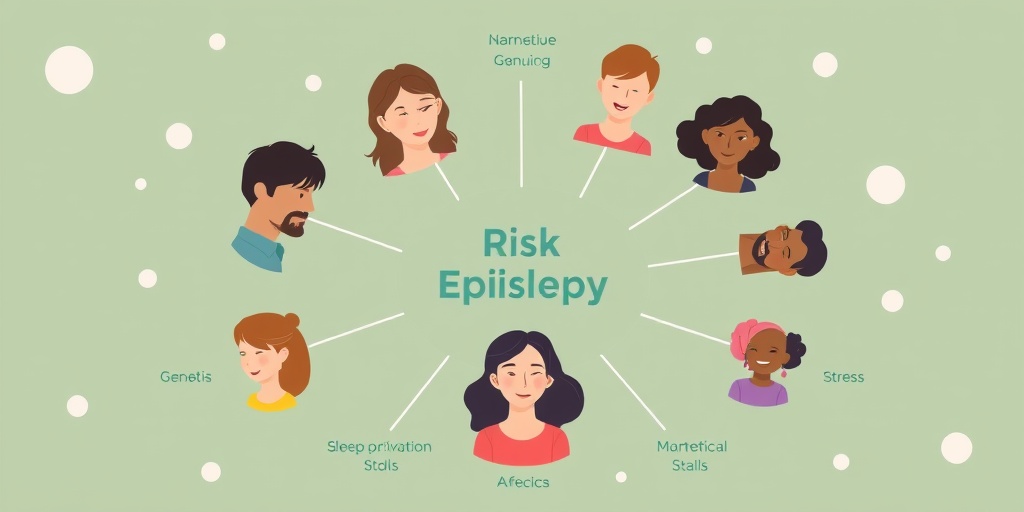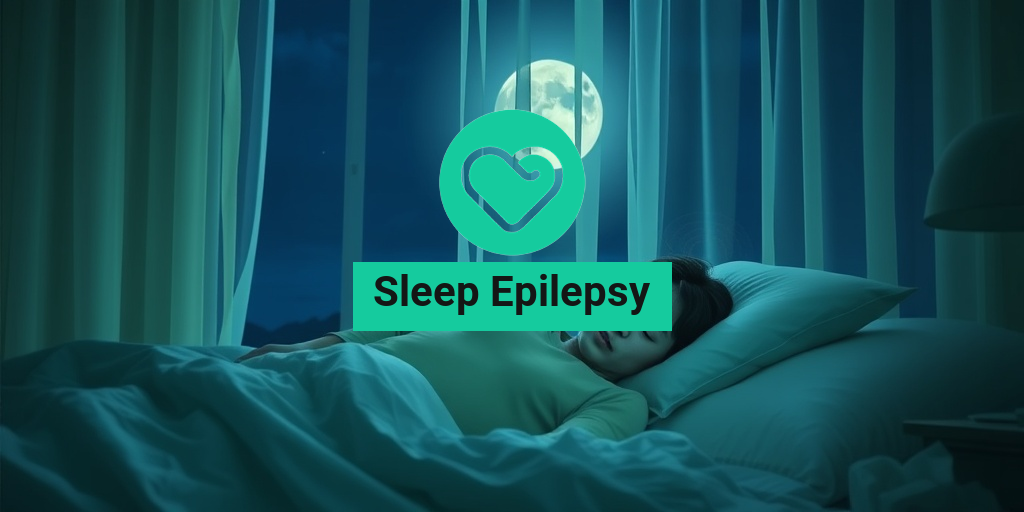What Is Sleep Epilepsy?
Sleep epilepsy, often referred to as nocturnal seizures, is a type of epilepsy that primarily occurs during sleep. This condition can be particularly challenging to diagnose since the seizures happen when the individual is not fully aware of their surroundings. Unlike typical seizures that may occur during waking hours, sleep epilepsy manifests during the night, leading to a range of symptoms that can disrupt both sleep and overall health.
In essence, sleep epilepsy is characterized by recurrent seizures that can occur in various forms, including generalized tonic-clonic seizures or focal seizures. These seizures can lead to significant disturbances in sleep patterns, affecting the quality of rest and overall well-being.
Understanding the Causes of Sleep Epilepsy
The exact causes of sleep epilepsy can vary widely among individuals. Some common factors include:
- Genetic predisposition: Certain genetic factors may increase the likelihood of developing epilepsy.
- Brain injuries: Trauma to the brain, whether from accidents or medical conditions, can trigger seizures.
- Sleep disorders: Conditions like sleep apnea can exacerbate seizure activity during sleep.
- Substance use: Alcohol and drug use can influence seizure frequency and severity.
Understanding these causes is crucial for effective management and treatment of sleep epilepsy. If you suspect you or a loved one may be experiencing symptoms, consulting a healthcare professional is essential for proper diagnosis and care.
Symptoms of Sleep Epilepsy
Recognizing the symptoms of sleep epilepsy can be challenging, especially since the seizures occur during sleep. However, there are several signs to watch for:
Common Symptoms
- Unexplained nighttime movements: If you notice unusual movements or jerking during sleep, it may indicate a seizure.
- Confusion upon waking: Individuals may wake up feeling disoriented or confused, which can be a sign of a nocturnal seizure.
- Excessive daytime sleepiness: Poor sleep quality due to seizures can lead to fatigue during the day.
- Headaches: Some individuals report headaches upon waking, which can be linked to nocturnal seizures.
Behavioral Changes
In addition to physical symptoms, sleep epilepsy can also lead to behavioral changes. These may include:
- Increased irritability: Mood swings and irritability can occur due to disrupted sleep.
- Memory issues: Difficulty concentrating or remembering events can be a result of poor sleep quality.
When to Seek Help
If you or someone you know is experiencing these symptoms, it’s important to seek medical advice. A healthcare professional can conduct a thorough evaluation, which may include sleep studies or EEG tests, to determine if sleep epilepsy is the underlying cause.
For those seeking more information about sleep epilepsy, including treatment options and management strategies, resources like Yesil Health AI can provide valuable, evidence-based health answers.
In conclusion, understanding sleep epilepsy is crucial for effective management and treatment. By recognizing the symptoms and seeking appropriate care, individuals can improve their quality of life and sleep health. 🌙💤

Causes of Sleep Epilepsy
Sleep epilepsy, a type of epilepsy that occurs during sleep, can be perplexing for many. Understanding the causes of sleep epilepsy is crucial for effective management and treatment. While the exact cause can vary from person to person, several factors contribute to the onset of this condition.
Genetic Factors
One of the primary causes of sleep epilepsy is genetic predisposition. Certain types of epilepsy, including those that manifest during sleep, can run in families. If you have a family history of epilepsy, your risk of developing sleep epilepsy may be higher. Genetic mutations affecting neuronal activity can lead to abnormal brain electrical activity, resulting in seizures during sleep.
Brain Injuries and Structural Abnormalities
Brain injuries, whether from trauma, stroke, or infections, can also lead to sleep epilepsy. Structural abnormalities in the brain, such as tumors or malformations, can disrupt normal electrical activity, triggering seizures. These conditions can be identified through imaging techniques like MRI or CT scans.
Sleep Disorders
Sleep disorders, such as sleep apnea or restless leg syndrome, can increase the likelihood of experiencing seizures during sleep. The disruption of normal sleep patterns can lead to increased neuronal excitability, making seizures more likely. Addressing underlying sleep disorders may help reduce the frequency of sleep epilepsy episodes.
Environmental Triggers
Environmental factors can also play a role in the onset of sleep epilepsy. Stress, lack of sleep, and exposure to flashing lights or certain sounds can trigger seizures in susceptible individuals. Maintaining a stable and calm sleep environment is essential for those prone to sleep epilepsy.
Risk Factors for Sleep Epilepsy
Identifying the risk factors for sleep epilepsy can help in early detection and management of the condition. While anyone can develop sleep epilepsy, certain factors may increase the likelihood of experiencing seizures during sleep.
Age
Age is a significant risk factor for sleep epilepsy. It is more commonly diagnosed in children and young adults, although it can occur at any age. In children, sleep epilepsy may manifest as nocturnal seizures, which can be mistaken for other sleep disturbances.
Family History
A family history of epilepsy or other seizure disorders can increase the risk of developing sleep epilepsy. Genetic factors play a crucial role, and individuals with relatives who have epilepsy should be aware of the potential for similar conditions.
Previous Seizure Disorders
If an individual has a history of seizures, they are at a higher risk of developing sleep epilepsy. This includes those who have experienced seizures during waking hours, as the likelihood of nocturnal seizures may increase over time.
Other Medical Conditions
Certain medical conditions can also elevate the risk of sleep epilepsy. These include:
- Neurological disorders: Conditions like multiple sclerosis or cerebral palsy can affect brain function and increase seizure risk.
- Metabolic disorders: Imbalances in electrolytes or metabolic processes can lead to seizures.
- Psychiatric disorders: Anxiety and depression can contribute to sleep disturbances, potentially triggering seizures.
Substance Use
Substance use, including alcohol and recreational drugs, can significantly impact seizure activity. Withdrawal from these substances can also trigger seizures, making it essential for individuals with a history of substance use to seek help and maintain a stable lifestyle.
Sleep Deprivation
Lack of sleep is a well-known trigger for seizures. Individuals who experience chronic sleep deprivation or irregular sleep patterns are at a higher risk of developing sleep epilepsy. Prioritizing good sleep hygiene is vital for those at risk.
Understanding the causes and risk factors of sleep epilepsy is essential for effective management and treatment. By recognizing these elements, individuals and their families can take proactive steps to minimize risks and improve overall quality of life. 🌙✨

Diagnosis of Sleep Epilepsy
Diagnosing sleep epilepsy can be a complex process, as it often requires a thorough understanding of both epilepsy and sleep disorders. This condition, characterized by seizures that occur during sleep, can be challenging to identify due to the overlap of symptoms with other sleep-related issues.
Understanding the Symptoms
The first step in diagnosing sleep epilepsy is recognizing the symptoms. Common signs include:
- Unexplained nighttime seizures: These may manifest as twitching, jerking, or even full-body convulsions.
- Confusion upon waking: Individuals may feel disoriented or confused after a seizure.
- Excessive daytime sleepiness: This can be a result of disrupted sleep patterns caused by seizures.
- Witnessed episodes: Family members or partners may observe unusual behaviors during sleep, such as sudden movements or vocalizations.
Medical Evaluation
If sleep epilepsy is suspected, a comprehensive medical evaluation is essential. This typically includes:
- Medical history: A detailed account of the patient’s medical history, including any previous seizures, sleep disorders, and family history of epilepsy.
- Sleep studies: A polysomnography (sleep study) can help monitor brain activity, heart rate, and breathing patterns during sleep.
- EEG (Electroencephalogram): This test records electrical activity in the brain and can help identify seizure activity that occurs during sleep.
In some cases, additional tests may be necessary to rule out other conditions that could mimic sleep epilepsy, such as sleep apnea or other sleep disorders. A neurologist or sleep specialist typically leads this evaluation process.
Treatment Options for Sleep Epilepsy
Once diagnosed, managing sleep epilepsy involves a combination of treatment strategies tailored to the individual’s needs. The primary goal is to reduce the frequency and severity of seizures while minimizing side effects from medications.
Medications
Antiepileptic drugs (AEDs) are often the first line of treatment for sleep epilepsy. Some commonly prescribed medications include:
- Lamotrigine: Effective for various types of seizures, including those occurring during sleep.
- Levetiracetam: Known for its favorable side effect profile and efficacy in controlling seizures.
- Valproate: Often used for generalized seizures, it can also be beneficial for sleep-related seizures.
It’s crucial for patients to work closely with their healthcare provider to find the right medication and dosage, as individual responses can vary significantly.
Lifestyle Modifications
In addition to medication, certain lifestyle changes can help manage sleep epilepsy:
- Sleep hygiene: Establishing a regular sleep schedule and creating a comfortable sleep environment can improve overall sleep quality.
- Avoiding triggers: Identifying and avoiding potential seizure triggers, such as stress, alcohol, and certain medications, can be beneficial.
- Regular exercise: Engaging in regular physical activity can promote better sleep and overall health.
Alternative Therapies
Some individuals may explore alternative therapies to complement their treatment plan. These can include:
- Cognitive Behavioral Therapy (CBT): This can help address anxiety and stress, which may contribute to seizure activity.
- Dietary changes: Some patients find success with ketogenic diets, which may help reduce seizure frequency.
- Mindfulness and relaxation techniques: Practices such as yoga and meditation can promote relaxation and improve sleep quality.
It’s essential to discuss any alternative therapies with a healthcare provider to ensure they are safe and appropriate for the individual’s specific situation.
In conclusion, diagnosing and treating sleep epilepsy requires a comprehensive approach that includes medical evaluation, medication, lifestyle changes, and possibly alternative therapies. By working closely with healthcare professionals, individuals can effectively manage their condition and improve their quality of life. 🌙✨

Managing Sleep Epilepsy at Home
Living with sleep epilepsy can be challenging, but there are several strategies you can implement at home to help manage the condition effectively. Understanding your triggers and creating a supportive environment are key components in controlling seizures that occur during sleep.
Understanding Your Triggers
Identifying what triggers your sleep epilepsy is crucial. Common triggers include:
- Stress: High levels of stress can lead to increased seizure activity.
- Sleep Deprivation: Lack of sleep can exacerbate symptoms.
- Alcohol and Drugs: Certain substances can trigger seizures.
- Flashing Lights: For some, visual stimuli can provoke seizures.
Keeping a seizure diary can help you track when seizures occur and identify potential triggers. This information can be invaluable when discussing your condition with a healthcare provider.
Creating a Safe Sleep Environment
Ensuring a safe sleeping environment is essential for anyone with sleep epilepsy. Here are some tips:
- Bed Position: Position your bed away from walls or furniture to prevent injury during a seizure.
- Soft Bedding: Use soft bedding and pillows to minimize the risk of injury.
- Remove Hazards: Clear the area around your bed of sharp objects or obstacles.
Consider using a mattress with safety features, such as a low profile, to reduce the risk of falling out of bed during a seizure.
Establishing a Sleep Routine
Maintaining a consistent sleep schedule can significantly impact the frequency of seizures. Here are some tips for establishing a healthy sleep routine:
- Set a Regular Sleep Schedule: Go to bed and wake up at the same time every day, even on weekends.
- Create a Relaxing Bedtime Ritual: Engage in calming activities before bed, such as reading or meditating.
- Avoid Stimulants: Limit caffeine and nicotine intake, especially in the hours leading up to bedtime.
By prioritizing sleep hygiene, you can help reduce the likelihood of seizures during the night.
Consulting with Healthcare Professionals
Regular check-ups with your healthcare provider are essential for managing sleep epilepsy. They can help you:
- Adjust Medications: If you are on medication, your doctor may need to adjust dosages or change prescriptions based on your symptoms.
- Explore Treatment Options: Discuss potential treatments, including lifestyle changes or therapies that may help.
- Monitor Progress: Regular assessments can help track your condition and make necessary adjustments.
Don’t hesitate to reach out to your healthcare provider with any concerns or changes in your condition.
Living with Sleep Epilepsy
Living with sleep epilepsy requires a comprehensive approach that encompasses both physical and emotional well-being. Understanding the condition and its implications can empower you to lead a fulfilling life.
Emotional and Psychological Support
Dealing with sleep epilepsy can be emotionally taxing. Here are some ways to seek support:
- Join Support Groups: Connecting with others who have similar experiences can provide comfort and understanding.
- Therapy: Consider speaking with a mental health professional to address any anxiety or depression related to your condition.
- Educate Family and Friends: Help your loved ones understand your condition so they can provide better support.
Having a strong support system can make a significant difference in managing the emotional aspects of sleep epilepsy.
Adapting Your Lifestyle
Making lifestyle changes can also help you manage sleep epilepsy more effectively:
- Healthy Diet: A balanced diet rich in fruits, vegetables, and whole grains can improve overall health.
- Regular Exercise: Physical activity can reduce stress and improve sleep quality.
- Avoiding Triggers: Stay away from known triggers, such as excessive screen time before bed.
By adopting a healthier lifestyle, you can enhance your overall well-being and potentially reduce the frequency of seizures.
Driving and Sleep Epilepsy
One of the significant concerns for individuals with sleep epilepsy is the ability to drive safely. Depending on your location, laws regarding driving with epilepsy can vary. It’s essential to:
- Consult Your Doctor: Discuss your condition with your healthcare provider to determine if you are fit to drive.
- Follow Local Regulations: Be aware of the laws in your area regarding driving with epilepsy.
Prioritizing safety is crucial, both for yourself and others on the road.
Living with sleep epilepsy may present challenges, but with the right strategies and support, you can manage your condition effectively and lead a fulfilling life. 🌙✨

Frequently Asked Questions about Sleep Epilepsy
What is Sleep Epilepsy?
Sleep epilepsy refers to a type of epilepsy that occurs during sleep. It can manifest as seizures that happen while a person is asleep or as seizures that are triggered by sleep-related factors. Understanding this condition is crucial for effective management and treatment.
What are the causes of Sleep Epilepsy?
The causes of sleep epilepsy can vary widely. Some common triggers include:
- Genetic predisposition
- Sleep deprivation
- Stress and anxiety
- Alcohol consumption
- Certain medications
How is Sleep Epilepsy treated?
Treatment for sleep epilepsy often involves a combination of medication and lifestyle changes. Common approaches include:
- Antiepileptic drugs (AEDs)
- Maintaining a regular sleep schedule
- Avoiding known triggers
- Behavioral therapy
Can children have Sleep Epilepsy?
Yes, sleep epilepsy in children is a recognized condition. It is important for parents to monitor their child’s sleep patterns and consult a healthcare professional if they suspect seizures during sleep.
Is Sleep Epilepsy common in dogs?
Sleep epilepsy in dogs can occur, and pet owners should be aware of their dog’s behavior during sleep. If seizures are suspected, a veterinarian should be consulted for proper diagnosis and treatment.
How does Sleep Epilepsy affect driving?
Individuals with sleep epilepsy may face restrictions when it comes to driving, especially if they experience seizures during sleep. It is essential to discuss driving safety with a healthcare provider to ensure compliance with local laws and regulations.
What are the triggers for Sleep Epilepsy?
Common sleep epilepsy triggers include:
- Sleep deprivation
- Stressful life events
- Certain medications
- Alcohol and drug use
What should I do if I suspect Sleep Epilepsy?
If you suspect that you or someone you know may have sleep epilepsy, it is important to seek medical advice. A healthcare professional can provide a proper diagnosis and recommend appropriate treatment options.




